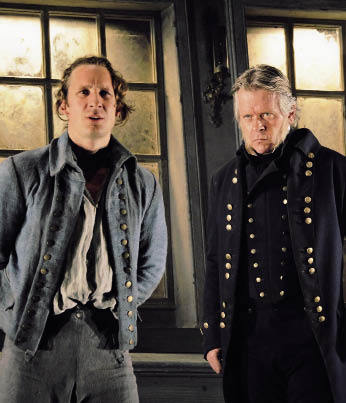Così fan tutte
In rep until 17 July
Billy Budd
In rep until 27 June
Glyndebourne
Glyndebourne has opened this year with two troubling operas, but ones which disturb in quite different ways. Così fan tutte is described by Max Loppert, in an excellent essay in the programme, as ‘the cruellest and most disturbing opera ever written’, and, though I can think of a couple of others that might equally lay claim to that title, there is no doubt that Così is a harrowing work, ever more so the more one knows it: which is not at all to deny that it is a comedy — that is what makes it so terrible.
This revival of Nicholas Hytner’s 2006 production is superb, if not in every respect quite as fine as the first time round. Its distinctive feature, perhaps, is that it is very much on the girls’ side, making their suitors seem almost as detestable as their (the suitors’) mentor Don Alfonso. Guglielmo is all swaggering sexual self-confidence, as played by the tall, dark and handsome Robert Gleadow; Fiordiligi’s collapsing into Ferrando’s arms is seen as an insult worthy of the death sentence — he really means it when he says ‘I wish they were drinking poison’ during the sublime canon of troth-plighting. Allan Clayton’s Ferrando is less conceited, but a budding Don Alfonso himself.
By contrast, the girls are adorable, Barbara Senator’s Dorabella flirtatious but vulnerable, while Sally Matthews is heartbreaking as Fiordiligi. She was the redeeming feature of the Royal Opera’s deplorable revival earlier this year; here she is the near-tragic centre. And in the acoustics of the smaller theatre her wild histrionics take on a further dimension, and the duet in which she finally yields to Ferrando registers a dreadful blow to any lingering faith one might have in fidelity. Alfonso is saturnine, suave and hateful, while the Despina of Anna Maria Panzarella has clearly been round the block a few times.
The surprising feature of Sir Charles Mackerras’s conducting was how relaxed it was, especially in Act II, which was in danger of sprawling. The Orchestra of the Age of Enlightenment had its slack moments, but the spirit of the work was present in every bar, sad and hedonistic, a sustained rebuke to anyone who thought Così allowed you to laugh on the right side of your face.
Billy Budd receives its first Glyndebourne production in a largely traditional staging, the whole stage representing the inside of HMS Indomitable with a solidity that one rarely sees in opera houses these days. A nautical friend assures me that the vessel is far less seaworthy than I took it to be, but it serves very well to impress landlubbers. Mark Elder’s conducting is immaculate, lucid, lacking only the brutal force which is needed for a couple of the work’s rare climaxes. But he catches powerfully the claustrophobia of everyone’s waiting for the fog to lift, and demonstrates once more that he is one of the most reliable conductors in the world today.
He is working, too, with an almost uniformly strong cast, of which I was most impressed by John Mark Ainsley’s Captain Vere. Is Vere the central character, or does it matter? Yes and yes. Or anyway in this production. Billy himself, well taken by Jacques Imbrailo, can’t really be the central character, since he is innocent to a boring degree, remarkable only for his capacity to elicit strong reactions. Vere’s reaction is entirely positive, the only question being whether he would like to be much closer to Billy than he is. Of course there is the passage where he goes in to Billy and tells him of the ‘court’s’ decision to have him hanged, while the orchestra plays 34 contrasting chords; but that is a gimmick, leaving open every possibility.
My feeling is that Britten and Forster were doomed to collaborate, and that Melville’s Billy Budd, itself metaphysically fogbound, brought out the worst in both of them. There are phrases in the novella which lead one irresistibly, now, to see it as having a strong homoerotic subtext; but the opera positively — and negatively — heaves with that. Where Melville leaves Claggart unexplained, the opera gives him an unconvincing ‘Creed’, though it can be less unpersuasive than Phillip Ens made it; and where Melville has his Vere spelling out in considerable detail why Billy must hang, Forster and Britten like that to be mysterious.
Wonderful as all the musical trappings in this opera are, at its heart there is a void or, worse, sentimentality. How can we cope with this illiterate sweetie singing ‘But I’ve sighted a sail in the storm, the far-shining sail that’s not Fate, and I’m contented. I’ve seen where she’s bound for. She has a land of her own where she’ll anchor for ever’, etc.? Words not heard by Vere, but taken up by him at the end, when he feels ‘saved and blessed’ by Billy. This is the kind of thing that reminds one that ten years later Britten was to produce the classy kitsch of the War Requiem.






Comments